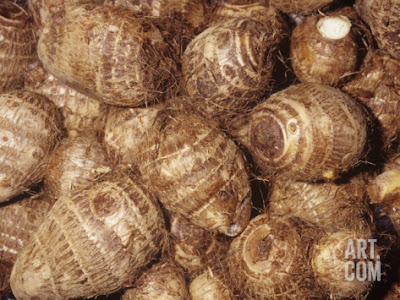Cocoyam
Cocoyam (Taro) is a common name for the corms and tubers of
several plants in the family Araceae. It is a perennial, tropical plant
primarily grown as a root vegetable for its edible starchy corm, and as a leaf
vegetable and is considered a staple in African, Oceanic and Asian cultures. It
is believed to have been one of the earliest cultivated plants
Health benefits
Cocoyam’s richness in vitamin B6 and magnesium makes good
for controlling high blood pressure and protect the heart.
• It is one of the finest source dietary fibers; 100g
flesh provides 4.1g or 11 percent of daily requirement of dietary fiber.
Together with slow digesting complex carbohydrates, moderate amounts of fiber
in the food help gradual rise in blood sugar levels.
• Cocoyam leaves as well as yellow-fleshed roots have
significant levels of phenolic flavoniod pigment antioxidants such as
B-carotenes, and crypotxanthin along with vitamin A. 100g fresh cocoyam leaves
provide 4825 IU or 161 percent of RDA of vitamin A. altogether; these compounds
are required for maintaining healthy mucus membranes, slain and vision
consumption of natural foods rich in flavonoid helps to protect from lung and
oral cavity cancers.
• It also contains good levels of valuable B-complex
groups of vitamins such as pyridoxine. (vitamin B-6), folates, riboflavin,
pantothenic acid, and thiamin.
• The corms provide healthy amounts of some important minerals like zinc, magnesium, copper, iron and manganese. In addition the root has very good amounts of potassium. Potassium is an important component of cell and body fluids that help regulate heart rate and blood pressure.
• Regular consumption of cocoyam is good for those who
are trying to lose weight because of its low caloric and high fiber content.
• It is ideal food for cancer prevention, cocoyam has
low fat and sodium content, this make it an ideal food for preventing hardening
of the arteries, which is usually caused by eating foods that are heavy in
cholesterol. Because cocoyam has minimal amount of fat, you can eat
several servings of cocoyam and not worry about going unwanted pounds or other
risks, which are associated with fatty foods such as heart or kidney diseases


No comments:
Post a Comment